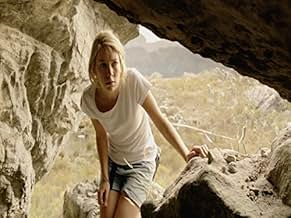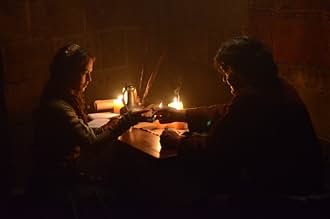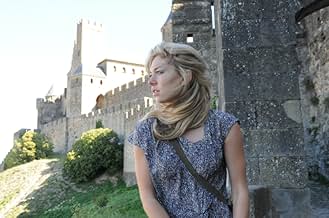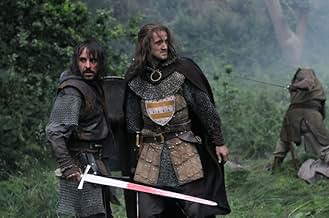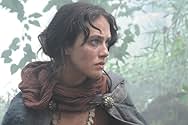Adicionar um enredo no seu idiomaFollows two women in two different eras both in search of the Holy Grail.Follows two women in two different eras both in search of the Holy Grail.Follows two women in two different eras both in search of the Holy Grail.
Explorar episódios
Avaliações em destaque
It's quite possible that the low reviews for this series are influenced by its religious themes. Yet the producers must have been aware of the risk. Religion can be a polarizing subject. Any misstep-real or perceived-could lead to backlash.
However, I see the religious elements as metaphors, similar to how the shark in Jaws represented more than just a predator. This series, like Jaws, is ultimately about human experience. Themes of fear, guilt, redemption, and existential questioning resonate on multiple levels. When viewed this way, the characters' struggles feel more real and profound.
I give the series a 6.5 not only for the engaging characters, but also for the courage shown by the series creators.
However, I see the religious elements as metaphors, similar to how the shark in Jaws represented more than just a predator. This series, like Jaws, is ultimately about human experience. Themes of fear, guilt, redemption, and existential questioning resonate on multiple levels. When viewed this way, the characters' struggles feel more real and profound.
I give the series a 6.5 not only for the engaging characters, but also for the courage shown by the series creators.
Somber. Poignant. Thought Provoking. I was thinking about the film and its implications long after it was over. It echoes so many repeated events in history of committing acts of violence, all in the name of religion. The crusading party proclaiming itself morally correct and never guilty. To be honest, I never knew about the Cathars and their fate until I watched this miniseries. It really got me interested in learning more about them.
So much criticism from other people and low ratings because the feature was dark and portrayed a harsh reality of a very dark aspect of Christianity. I felt compelled to chime in with the minority of viewers who liked this feature. The film neither revels nor vilifies the darkness and violence of the antagonists. Instead it gives a realistic portrayal of historical events as much as we can know them. This is especially true during the Medieval ages. It was a time rife with examples of religions committing heinous and cruel acts of violence against "non-believers", all in the name of God and Christianity. There are plenty of examples from history where many were converted to Christianity under duress through acts of violence, at a sword point, hanging, beheading, etc. The film takes great care not to go overboard with either the victims or villains portrayal and paints a very haunting picture of medieval France and the Crusades and the Cathar massacres.
The acting was very good across the board for the Medieval portion of the story (with some minor exceptions). Tom Felton as Viscount Trencavel delivered an especially passionate and spirited performance as a noble and charismatic leader of Carcassonne. Jessica Brown Findlay as medieval Alaïs Pelletier du Mas and Emun Elliott as her husband, Guilhem Du Mas brought a very evocative performance as well, making the ending of the story that much more powerful and tragic.
The beautiful soundtrack, scenery and landscapes, believable settings, good costuming along with strong performances all contributed to an engrossing story. Though occasionally slow, the thick as tar tension, atmosphere and believable acting keep the story moving forward and viewers invested in the events and characters.
Perhaps my only one but big complaint was the back and forth switching between medieval and modern times. It was distracting at times, and I did not feel the 2012 events connected well with the past. Some plot points felt contrite and forced to fit the events of 1209 Carcassonne. The whole modern time arch felt just thrown together, not nearly as interesting, and realistic as the past. As if instinctively sensing that the 2012 events really didn't belong in the series, the scriptwriter's and actors' performances and the characters' stories were uninspiring and not nearly as compelling and believable. The modern part of the story did not connect well with the medieval part and was too disjointed to be its own separate story. I just found it too hard to care for its characters. I wish they had focused exclusively on Cathars of medieval Carcassonne. It was a fascinating story, albeit a tragic one, that deserves more coverage.
If you have an interest in history in general or consider yourself a history savant, then grab a cup of soothing chamomile tea and watch the miniseries. I am giving this film a high rating solely based on the strength of the medieval story.
So much criticism from other people and low ratings because the feature was dark and portrayed a harsh reality of a very dark aspect of Christianity. I felt compelled to chime in with the minority of viewers who liked this feature. The film neither revels nor vilifies the darkness and violence of the antagonists. Instead it gives a realistic portrayal of historical events as much as we can know them. This is especially true during the Medieval ages. It was a time rife with examples of religions committing heinous and cruel acts of violence against "non-believers", all in the name of God and Christianity. There are plenty of examples from history where many were converted to Christianity under duress through acts of violence, at a sword point, hanging, beheading, etc. The film takes great care not to go overboard with either the victims or villains portrayal and paints a very haunting picture of medieval France and the Crusades and the Cathar massacres.
The acting was very good across the board for the Medieval portion of the story (with some minor exceptions). Tom Felton as Viscount Trencavel delivered an especially passionate and spirited performance as a noble and charismatic leader of Carcassonne. Jessica Brown Findlay as medieval Alaïs Pelletier du Mas and Emun Elliott as her husband, Guilhem Du Mas brought a very evocative performance as well, making the ending of the story that much more powerful and tragic.
The beautiful soundtrack, scenery and landscapes, believable settings, good costuming along with strong performances all contributed to an engrossing story. Though occasionally slow, the thick as tar tension, atmosphere and believable acting keep the story moving forward and viewers invested in the events and characters.
Perhaps my only one but big complaint was the back and forth switching between medieval and modern times. It was distracting at times, and I did not feel the 2012 events connected well with the past. Some plot points felt contrite and forced to fit the events of 1209 Carcassonne. The whole modern time arch felt just thrown together, not nearly as interesting, and realistic as the past. As if instinctively sensing that the 2012 events really didn't belong in the series, the scriptwriter's and actors' performances and the characters' stories were uninspiring and not nearly as compelling and believable. The modern part of the story did not connect well with the medieval part and was too disjointed to be its own separate story. I just found it too hard to care for its characters. I wish they had focused exclusively on Cathars of medieval Carcassonne. It was a fascinating story, albeit a tragic one, that deserves more coverage.
If you have an interest in history in general or consider yourself a history savant, then grab a cup of soothing chamomile tea and watch the miniseries. I am giving this film a high rating solely based on the strength of the medieval story.
First of all, I think the story on Cathars is a brilliant topic for film - barely touched in films. I'm disappointed that not everything was filmed in location (Southern Africa? Why? Languedoc and around wasn't good enough?). The other thing, but it's a personal thing, the archaeological excavations were rubbish - nobody digs like that! (but I'm an archaeologist, so it's my thing). I didn't really enjoy the modern part of the story because of acting - actors and actresses were very stiff and unnatural. It looks like the modern story was directed and filmed by somebody else, but the Medieval part was much better in execution. I give 9 for the Medieval part and 3 for modern part, so it's 6 in general. My opinion is based on the first episode.
Oh dear. How sad. Never mind. Great book. Rubbish film. That just about sums it up for me. Having enjoyed the book so much I was really looking forward to this when I stumbled upon it in the Weekend TV Supplement, but where was the pre-publicity or trailers? Maybe the TV execs knew they had a turkey on their hands when they scheduled it on two consecutive nights over a long weekend when they knew that half the nation would be on holiday. It wasn't all bad - the screenplay was pretty close to the book, which is good, but at nearly 700 pages it is a big ask, and it has to be down to the screenwriter and director to put the story across in an accessible way, and on this occasion I think they have fallen short. The locations, lavish sets, costumes, and the star cast, were all great however. But something was lacking. I wish I could put my finger on it.It was all a bit clichéd. I know the body count was pretty high but there were far too many death-bed scenes when profound words are exchanged just before they croak and the eyes go north. I rarely criticise actors because they can only work with the material they are given but it would help if they could articulate a little more clearly. Without the help of subtitles (and having read the book) I would probably not have had a clue what was going on. Poor Jessica Findlay-Brown has an unfortunate speech defect that when she speaks quietly she breaks into a whisper every other syllable. Very distracting. And central casting please note - Tom Felton, fine actor though he is, does not have the physical presence or vocal gravitas to carry off the part of a warrior leader. And why was it necessary to cast Will as an American? This is a European story about European culture with European settings and characters. No need for a token American. This film will bomb in America anyway with their bite-size attention span. Can you imagine this complex storyline on American TV with adverts every five minutes? The audience will quickly lose the plot if not the will to live! Oh dear. How sad. Never mind. There, I've said it again.
"Labyrinth" is an entertaining mini-series disclosing two stories, one in 1209 and the other in 2012, in France. Alais Pelletier Du Mas (Jessica Brown Findlay) is followed in the Middle Ages, when the Crusade attack the City of Carcassonne where she lives with her father and her evil stepsister. In the present days (2012), her descendant Alice Tanner (Vanessa Kirby), who is a teacher working with her archeologist friend in a dig, is chased by a mysterious ring that is looking for three ancient books and a ring to achieve power and eternal life through the Holy Grail. The historical event and the fictional present are entwinned and is attractive for a television mini-series. My vote is seven.
Title (Brazil): "Labirinto" ("Labyrinth")
Title (Brazil): "Labirinto" ("Labyrinth")
Você sabia?
- CuriosidadesIn episode 2, Kate Mosse, the author of the book on which the mini-series is based, makes a cameo as a tour guide.
Principais escolhas
Faça login para avaliar e ver a lista de recomendações personalizadas
- How many seasons does Labyrinth have?Fornecido pela Alexa
Detalhes
- Data de lançamento
- Países de origem
- Idioma
- Também conhecido como
- Labyrinth
- Locações de filme
- Empresas de produção
- Consulte mais créditos da empresa na IMDbPro
Contribua para esta página
Sugerir uma alteração ou adicionar conteúdo ausente



